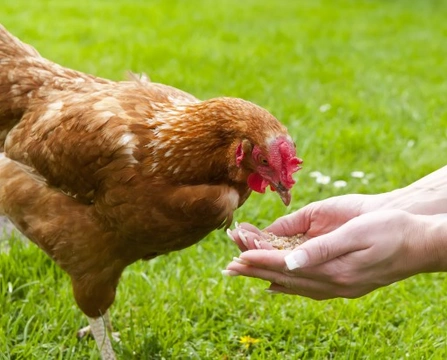
4 Vitamin Deficiencies Seen in Chickens
Having a few chickens running around a back garden or property is great fun and if you have lots of kitchen scraps that need disposing of, chickens make great recycling bins, as long as they are safe to give to your hens that is. However, you need to understand the dietary needs of your hens so they stay nice and healthy because there are a few deficiencies that can make your birds very ill and could prove fatal if not treated sooner rather than later.
1. Vitamin A Deficiency also Known as Nutritional Roup
This is a condition that, luckily, is not that commonly seen in chickens but when evident, there are certain signs and symptoms to watch out for. Vitamin A deficiency typically affects chickens that were not fed enough of the vitamin between the ages of 1 to 7 weeks old. These days, most birds are fed specifically formulated food which means they are less at risk of suffering from this type of vitamin deficiency. The symptoms to watch out for include the following:
- Poor growth and development
- Poor feather growth
- A discharge from noses and eyes
- Lethargy and drowsiness
- Very pale combs and wattles
- Eyelids often stuck shut due to thick discharge
Treating and Preventing Vitamin A Deficiency
By adding a Vitamin A supplement to their water on a daily basis should solve the problem but you would need to discuss the condition of your chickens with a vet so they can advise on the type of diet you should be feeding your birds to avoid the same thing from happening again. Their diet should ideally include a specifically formulated feed together with good quality raw food which could include kitchen scraps which are safe for chickens to eat. Adding antioxidants to your chickens diet is also recommended should they be suffering from a Vitamin A deficiency.
2. Vitamin B Deficiencies
Being water soluble, B vitamins cannot be stored in the body to any significant extent and therefore a continuous supply is needed to keep chickens nice and healthy. If hens suffer a Vitamin B deficiency, this can affect their eggs which may not hatch out due to the embryo not receiving enough of the vitamin as it develops in the shell.
The signs and symptoms to watch out for in Vitamin B deficiencies are quite numerous as it depends just which vitamin is lacking but are typically as follows:
- Curled toes – this is a type of paralysis
- Perosis
- Paralysis
- Scaly skin – a type of dermatitis
- Lesions of the mouth
- Conjunctivitis
- Anaemia
- Poor feather growth
- Fatty Liver and Kidney Syndrome
- Problems hatching eggs
Treating and Preventing Vitamin B Deficiencies
Supplementing their water with the correct Vitamin B will normally resolve the problem pretty quickly as long as the chickens are still drinking that is. You can buy good quality multivitamin solutions from feed merchants but you would to read the instructions on the amount to give your birds very carefully and if in doubt consult your vet first.
3. Vitamin E Deficiency
Chickens suffering a Vitamin E deficiency are normally being feed a diet that's too high in fat or where feed is rancid with muscular dystrophy often being seen in mature birds whereas younger chickens suffer from Encephalomalacia and exudative diathesis if fed the same incorrect diet.
The signs and symptoms to watch out for include the following:
- Loss of balance
- Chickens often stagger
- Involuntary movements
- Paralysis
- Ventral oedema
- Green wings
Treating and Preventing Vitamin E Deficiency
By supplementing your chicken's feed and water with Vitamin E and selenium, you can effectively help your birds recover. However, where serious skin lesions are a problem, a vet would normally recommend your chicken be put on a course of antibiotics which must be completed to be effective. When it comes to prevention, feeding a specifically formulated diet and good quality raw foods should help prevent any chickens from suffering from a vitamin E deficiency in the first place.
4. Biotin Deficiency
Luckily, since the advent of carefully formulated poultry feeds, biotin deficiency in chickens is far less common than it was in times past. However, this does not mean that birds don't still suffer from the condition if they are not fed correctly and very often biotin deficiency could lead to another condition known as fatty liver and kidney syndrome.
The Signs & Symptoms to Watch Out For
The symptoms and signs to watch our that a chicken may be suffering a deficiency of biotin include the following:
- Poor growth and development
- Weakness -especially in their legs
- Scabs forming around beaks and eyes
- Foot pads are hard with thick skin forming on them
- Chondrodystrophy
- Sudden death – fatty liver and kidney syndrome
Treating & Preventing Biotin Deficiency
Just by adding a biotin supplement either in your chicken's feed or water will help restore the balance. Biotin is naturally present in a lot of foodstuffs but these typically have low bioavailability so it is far wiser to add it by way of a supplement which you can purchase from most feed merchants.



